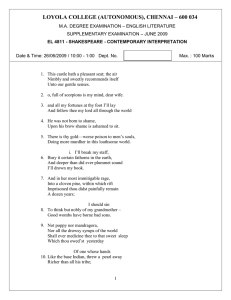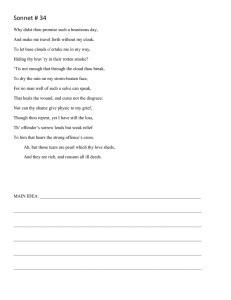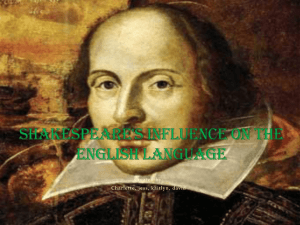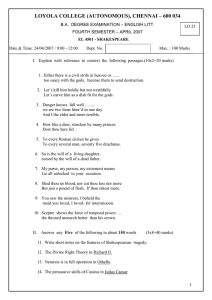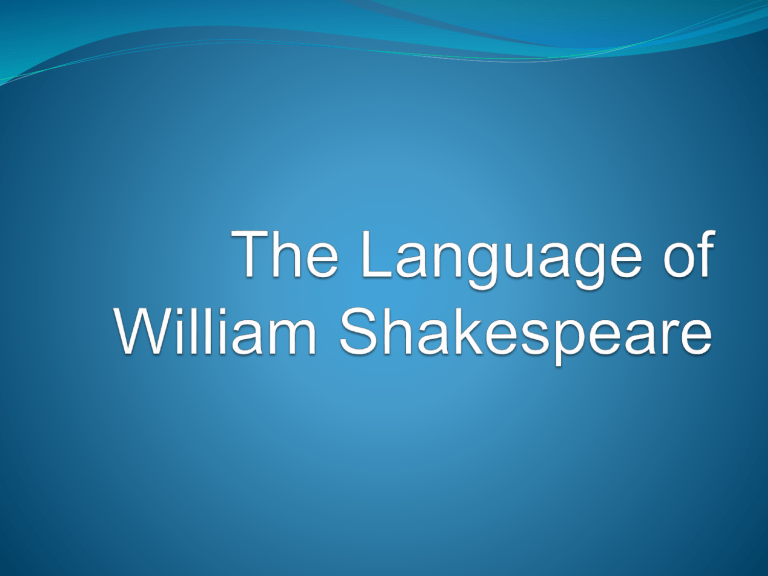
The Second Edition of the 20volume Oxford English Dictionary contains entries for about 750,000 words. Shakespeare used 31,534 words in his works. (Most adults have the vocabulary of 20,000-35,000 words though only about 5,000-8,000 words are actively used). Old English Faeder ure thu eart on heofonum, si thin nama gehalgod. Tobecume thin rice. Gewurthe thin willa on eorthan swa swa on heofonum. Do you think you know what it means? Middle English Oure fadir that art in heuenes, halwid be thi name; thi kyngdom cumme to; be thi wille don as in heuen and in erthe; gif to us this day ouer breed oure substaunce; and forgeue uo us oure dettis as we forgeue to oure dettours. Does this one make a little more sense? Early Modern English (1611) Our father, which art in Heaven, hallowed be thy name. Thy kingdom come; thy will be done on earth as it is in Heaven. Give us this day, our daily bread; and forgive us our debts as we forgive our debtors, and lead us not into temptation … Modern English Our Father in heaven, hallowed be your name. Your Kingdom come, your will be done, on earth as in heaven. Give us today our daily bread. Forgive us our sins, as we forgive those who sin against us. Lead us not into temptation, but deliver us from evil. For the kingdom, the power and the glory are yours. Now and forever. Amen. The Book of Common Prayer 1549 King James Bible 1611 Spelling - No standardized spelling; Shakespeare Shake-speare Shakspeare Shakespere Shakespear Shak-speare Shakspear Shakspere Shaksper Shakespheare Spelling - The Elizabethan alphabet contained 24 letters, as opposed to the present day alphabet of 26 letters; - In the Elizabethan alphabet the letters "u" and "v" were the same letter as were "i" and "j"; Spelling - The "j" was usually used as the capital form of the letter "i" in the Elizabethan alphabet; - The letter "u" was used only in the middle of a word, and the "v" was used at the beginning. Spelling - Another letter which resembled a "y" (a thorn) was used to represent the "th" sound. The word "the" was therefore written as "ye“; - Numbers were frequently written in lower case Roman numerals, with the last "i" in a number written as a "j". For example - viij March; Spelling - Letter “e” was often omitted and replaced with an apostrophe (despis’d – dispised), - A lot of words were contracted: 'tis ~ it is, th’ ~ the, o'er ~ over, ne'er ~ never, i' ~ in, e'er ~ ever, oft ~ often, e'en ~ even Grammar (Pronouns) How it is used Singular Plural Subject Thou Ye Object Thee You Possessive Adjetive Thy Your Possessive Noun Thine Yours “If thou art privy to the country’s fate…” “...the throne of Denmark to thy father” “By heaven I charge thee, speak” “As thou art to thyself” Grammar (Verb Forms) Verb Form Modern English Shakespeare’s English 2nd person singular No ending You give - st Thou givest 3d person singular -s He gives - th He giveth - If thou lovest me - sayst thou so -thou rememb’rest - thou told’st me -Shouldst thou be - if thou didst - Whither wilt thou lead me -Present Tense Now You - Then Thou - are have will art hast wilt can shall canst shalt do dost -Past Tense Now Then You - were had would could should did Thou - wast hadst wouldst couldst shouldst didst Grammar (Sentences) - Shakespeare often changed the word order in sentences: “These babes for Clarence weep” “So frowned he once” Vocabulary - Words that no longer exist in the English language; - Words that now have a different meaning; Vocabulary still = always, soft = slowly, an = if, perforce = you must, ay = yes, fain = gladly, anon = at once, wherefore= why Vocabulary - Shakespeare coined a lot of new words and phrases: Words: "advertising", "assassination", "bedazzled", "eventful", "eyesore", "fortune-teller“, "outbreak", "quarrelsome", "radiance", "reclusive", "unreal", "well-read", "watchdog" … Vocabulary Phrases: - All that glitters is not gold (The Merchant of Venice) - Bated breath (The Merchant of Venice) - Dead as a doornail (2Henry VI) - Too much of a good thing (As You Like It) Vocabulary Phrases: - For goodness' sake (Henry VIII) - Good riddance (Troilus and Cressida) - Laughing stock (The Merry Wives of Windsor) - Break the ice (The Taming Of The Shrew) Vocabulary Phrases: - Love is blind (Merchant of Venice) - Naked truth (Love's Labours Lost) - Own flesh and blood (Hamlet) - Wild-goose chase (Romeo and Juliet) 1. Blank verse unrhymed lines with an arrangement of unstressed and stressed syllables known as iambic pentameter “ In sooth I know not why I am so sad” (from The Merchant of Venice) 2. Variations on metre to make his verse less monotonous, Shakespeare: altered the pattern of unstressed and stressed syllables “that this too sullied flesh would melt” (from ‘Hamlet’) 2. Variations on metre to make his verse less monotonous, Shakespeare: altered the expected number of syllables “There’s nothing ill can dwell in such a temple” (from ‘The Tempest’) 2. Variations on metre to make his verse less monotonous, Shakespeare: divided a single line between two or more speakers Emilia: Why, would not you? Desdemona: No, by this heavenly light! (from Othello) 3. Use of verse and prose Verse Prose generally used: generally used: by aristocratic characters in serious or dramatic scenes by lower-class characters in comic scenes in informal conversations 4. Metaphors and similes “There’s daggers in men’s smiles” (from ‘Macbeth’) 4. Metaphors and similes “The quality of mercy is not strained. It droppeth as the gentle rain from heaven Upon the place beneath ” (from ‘The Merchant of Venice’) 5. Antithesis The contrast of direct opposites. “Why then, O brawling love, O loving hate, O anything, of nothing first created: O heavy lightness, serious vanity” (from ‘Romeo and Juliet’) 6. Repetition Repeated words or phrases add to the emotional intensity of a scene: “Oh horrible, oh horrible, most horrible!” (The Ghost in ‘Hamlet’) 6. Repetition Repeated words or phrases add to the comic effect: “O night, O night, alack, alack, alack, I fear my Thisbe’s promise is forgot! And thou, O wall, O sweet, O lovely wall.” (from ‘A Midsummer Night’s Dream’) 7. Hyperbole Extravagant and obvious exaggeration : “Blow me about in winds! Roast me in sulphur! Wash me in steep-down gulfs of liquid fire!” (from ‘Othello’) 7. Personification “Come, civil Night; Thou sober-suited matron all in black.” (from ‘Romeo and Juliet’) 8. Irony Verbal irony The audience Dramatic knows irony something that a character on stage does not It is structural: one line Saying one thing or scene contrasts but meaning another sharply with another In Julius Caesar, Mark Antony calls Brutus “an honourable man” but means the opposite In Macbeth Duncan’s line “He was a gentleman on whom I built an absolute trust” is followed by the stage direction “Enter Macbeth” 9. Pronouns: you and thee Send clear social signals You Thee Implies either closeness, friendship or contempt Used to address someone of higher social rank Can be aggressive or insulting More formal and distant form Suggests respect for a superior Courtesy to a social equal
